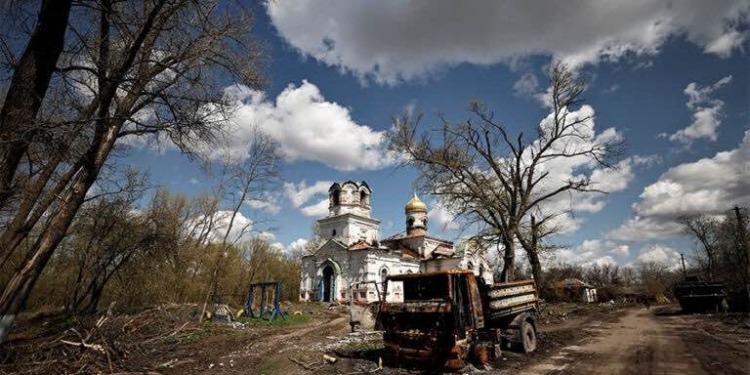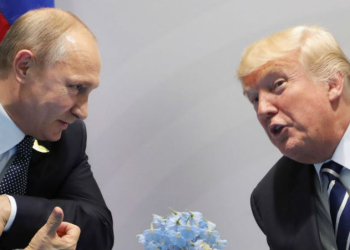The largest organization of religious leaders in Ukraine is backing a proposal by that nation’s president — approved by Ukrainian lawmakers Aug. 20 — to ban the Russian Orthodox Church and its affiliates, which have openly supported Russia’s decade-long war on Ukraine.
In an Aug. 17 statement, the Ukrainian Council of Churches and Religious Organizations, or UCCRO, which represents the various Christian, Jewish and Muslim bodies of Ukraine, said it endorsed President Volodymyr Zelenskyy’s legislative initiative “to make it impossible for such organizations to operate in our country,” noting as well that the measure enjoyed “broad political and public support.”
Ukraine’s parliament, the Verkhovna Rada, adopted the law “On the Protection of the Constitutional Order in the Field of Activities of Religious Organizations” Aug. 20. The measure prohibits the Russian Orthodox Church in Ukraine, as well as any Ukrainian Orthodox churches that opt to remain affiliated with the Moscow Patriarchate. Ukrainian Orthodox churches that divest from Moscow are free to operate. The law also provides for free usage of state and communal space by religious organizations.
The council said it had met with Zelenskyy Aug. 16 and discussed “protection of freedom of religion and spiritual independence of Ukraine, protection of constitutional order and public security, human rights and fundamental freedoms in the context of abuse by the aggressor country.”
UCCRO said its members “categorically condemn activities of Russian Orthodox Church, which has become an accomplice to the Russian invaders’ bloody crimes against humanity, which sanctifies weapons of mass destruction and openly declares the need to destroy Ukrainian statehood, culture, identity, and, more recently, Ukrainians themselves.”
Russian Orthodox clergy have consistently and openly blessed Russia’s war on Ukraine, which continues attacks launched in 2014 and which has been declared a genocide in two joint reports from the New Lines Institute and the Raoul Wallenberg Center for Human Rights.
Since its full-scale invasion of Ukraine in February 2022, Russia has destroyed at least 660 religious sites representing several faith confessions. Clergy and faithful of various denominations have been expelled, detained, tortured and, in some cases, killed.
In late June, Ukrainian Catholic priests Father Ivan Levitsky and Father Bohdan Geleta were released after a year and a half of Russian captivity, during which they were reported to be regularly tortured.
Russian occupation officials in the Zaporizhzhia region issued a written order in December 2022 banning the Ukrainian Greek Catholic Church, the Knights of Columbus and Caritas, the official humanitarian arm of the worldwide Catholic Church.
Patriarch Kirill, head of the Russian Orthodox Church and a close ally of Russian leader Vladimir Putin, has vigorously endorsed Russia’s aggression in Ukraine, even instructing followers in a September 2022 sermon that “sacrifice in the course of carrying out your military duty (in Ukraine) washes away all sins.”
During its March 27-28 congress, the World Russian People’s Council, led by Patriarch Kirill, declared Russia’s invasion of Ukraine — euphemistically referred to by the Kremlin as a “special military operation” — a “Holy War” that seeks to destroy Ukraine and that “from a spiritual and moral point of view” positions Russia as “protecting the world from the onslaught of globalism and the victory of the West that has fallen into Satanism.”
Historically, the Russian Orthodox faith has had a deeply entwined relationship with the state, fostering a religious nationalism known since the 19th century as “ethnophyletism.”
Close to 80% of Ukraine’s population identifies as Orthodox, but that affiliation has become increasingly complex in light of Russia’s decade of aggression against Ukraine.
In January 2019, Ecumenical Patriarch Bartholomew I of the Constantinople Patriarchate — the “first among equals” of the Orthodox churches — formally recognized the independence of the Orthodox Church of Ukraine. A few months prior, he had restored Metropolitan Filaret, head of the Ukrainian Orthodox Church-Kyiv Patriarchate — an independent Orthodox Church in Ukraine — to full communion.
In response, the Russian Orthodox Church severed communion with Constantinople.
The Ukrainian Orthodox Church, or UOC, which had traditionally remained loyal to Russia, broke with the Moscow Patriarchate in May 2022 over Patriarch Kirill’s stance on the invasion of Ukraine.
Despite the break, Ukrainian officials remain wary of the UOC, particularly those still allied with the Moscow Patriarchate and their lingering loyalty to Russia.
In December 2022, the Ukrainian government called for investigations of links between Ukrainian and Russian Orthodox churches, while formally banning activities of all religious organizations “affiliated with centers of influence” in Russia. Several suspected pro-Russian Orthodox clergy have been detained and searched. The Ukrainian government also reclaimed the Dormition Cathedral and the Refectory Church in Kyiv — part of the Kyiv-Pechersk Lavra complex, a UNESCO World Heritage site — after the UOC’s lease of the property expired Dec. 31, 2022.
An April 2024 poll by the Kyiv International Institute of Sociology found that 83% of Ukrainians would intervene in the activities of the UOC-MP, to one degree or another, with 63% saying they favored an outright ban.
Reiterating its April 2023 statement, UCCRO said that “partnerships and freedom of religion and their protection by the state are the basis of church-state relations in Ukraine, and no organization — whether religious or secular — that has its center in a country that has committed military aggression against our people and is governed by the aggressor state can operate in Ukraine.”
In response to pro-Russian criticism of the proposed ban, UCCRO said, “We affirm that religious rights and freedoms are respected in Ukraine, even amidst of brutal war, and that our believers, despite certain challenges related to the war, have the opportunity to express their religious feelings and beliefs with dignity.”
That assessment was also presented in a July 24 hearing before the U.S. Helsinki Commission in Washington. Catherine Wanner, professor of history, anthropology and religious studies at Pennsylvania State University and a specialist on religion in Soviet and post-Soviet Ukraine, told the commission that Ukraine’s religious demographics — which include Orthodox, Catholic, Protestant, Muslim and Jewish communities — reflect the nation’s “tolerance, religious diversity and religious pluralism as governing principles,” with religious symbols and practices “broadly accepted in public institutions and public space.”
But religious diversity “clashes with the imposition of the Russian world ideology that comes with Russian rule,” said Wanner during her commission testimony.
Such an ideology — which holds that Russia is a superior civilization entitled to expand at will, since it claims to safeguard conservative values and Orthodox Christianity — “justifies the repression of religious minorities and privileges Russian orthodoxy as a state-protected guardian of these traditional values of public morality and social and political order,” said Wanner.
Archbishop Yevstratiy Zorya, deputy head of the Orthodox Church of Ukraine’s Department of External Church Relations and a professor at the Kyiv (Orthodox) Theological Academy, told OSV News in a July 2023 interview that “the Russian Orthodox Church is not just under the control of the government; it is part of the government,” and that “the current leader of the Moscow Patriarchate, Patriarch Kirill, is more an official of the Kremlin regime than a real Christian leader.”
As the former Vladimir Mikhailovich Gundyayev, Patriarch Kirill was reported to have worked with the Soviet Union’s KGB intelligence service, particularly with respect to the World Council of Churches during the 1970s.
“The main threat to religious freedom in Ukraine is the Russian aggression, as a result of which dozens of clergymen were killed by the occupiers and hundreds of churches and houses of worship were destroyed,” said UCCRO in its statement. “The Moscow Patriarchate justifies pogroms and restrictions on religious freedom, torture and murders of priests and pastors, and cynically tramples on God’s instructions and basic norms of universal morality.”
The council added, “We are convinced that the course of protecting religious freedom and spiritual independence, by which we mean not isolation but openness to the high standards of our religious traditions while rejecting manipulations that involve faith and the use of religion to cover crimes, will help consolidate our society for the sake of our victory and establishment of the long-awaited just peace.”
OSV News





























Discussion about this post